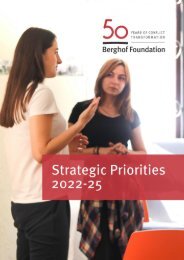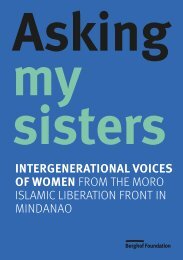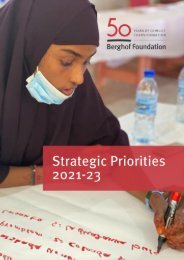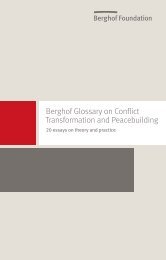Berghof Foundation: 50 years of conflict transformation
This book provides an overview of the Berghof Foundation’s work and impact over the past 50 years and sheds light on the challenges ahead of peacebuilding.
This book provides an overview of the Berghof Foundation’s work and impact over the past 50 years and sheds light on the challenges ahead of peacebuilding.
You also want an ePaper? Increase the reach of your titles
YUMPU automatically turns print PDFs into web optimized ePapers that Google loves.
Our vision<br />
A world changing for the better through<br />
constructive <strong>conflict</strong> <strong>transformation</strong>.<br />
Even in the midst <strong>of</strong> destruction,<br />
social and political <strong>conflict</strong> can develop forces<br />
<strong>of</strong> positive change, when people engage with<br />
each other constructively and together seek<br />
inclusive and peaceful ways to address the<br />
grievances and issues that divide them.<br />
Our mission<br />
To create space for <strong>conflict</strong> <strong>transformation</strong>.<br />
We bring people in <strong>conflict</strong> together.<br />
We enable and support learning processes that<br />
inspire the development <strong>of</strong> new perspectives,<br />
relationships and behaviour, thus opening<br />
possibilities for addressing <strong>conflict</strong> and<br />
finding ways <strong>of</strong> living together peacefully.<br />
16<br />
Principles <strong>of</strong> our approach<br />
Based on our understanding <strong>of</strong> each <strong>conflict</strong> context, we seek to<br />
respond adaptively to <strong>conflict</strong>-specific needs and opportunities as<br />
they evolve. At the same time, we remain committed to the following<br />
principles, which inform and guide our work.<br />
Partnership Conflict <strong>transformation</strong> is a<br />
collaborative and long-term process that requires<br />
collaborative efforts by multiple actors. Therefore,<br />
we build reliable and transparent partnerships based<br />
on mutual trust and respect in order to enhance<br />
combined capacities for peaceful change.<br />
Inclusivity Inclusivity means participation by<br />
those affected. It ensures that all relevant views<br />
and interests are addressed. Since it requires a<br />
willingness to engage, inclusivity can contribute<br />
to the building <strong>of</strong> trust and foster a culture <strong>of</strong><br />
constructive engagement.<br />
Multiple levels Protracted <strong>conflict</strong>s are systemic<br />
by nature and can sometimes involve societies<br />
as a whole. Therefore, we seek to engage people<br />
at all levels and build bridges, from grassroots<br />
communities and marginalized groups to combatants<br />
and political decision-makers.<br />
Multi-partiality Integrating opposing perspectives<br />
into a peaceful settlement <strong>of</strong> <strong>conflict</strong> requires that<br />
all sides are equally heard and taken into account.<br />
More than being impartial, we approach all parties<br />
with openness, trying to understand their underlying<br />
interests and motivations<br />
Ownership Ownership means enabling those<br />
we work with to become involved and assume<br />
responsibility for their <strong>conflict</strong> challenges.<br />
Therefore, we see our role as providing the support<br />
that empowers others to shape a better future for<br />
themselves.<br />
Reflection Conflict <strong>transformation</strong> is a mutual<br />
learning process that requires everyone involved<br />
to reflect critically on their role, policies and actions.<br />
Through systematic reflection and analysis, we<br />
seek to improve our practice and share our learning<br />
with research communities, policy makers and<br />
practitioners.<br />
Complementarity We do not work in isolation but<br />
rather aim at strengthening and building on existing<br />
initiatives. We bring unique strengths to complement<br />
ongoing processes. In some settings we support<br />
high-level dialogue and mediation processes.<br />
In others, we accompany civil society actors and<br />
movements.<br />
Accountability We assess the <strong>conflict</strong> sensitivity<br />
<strong>of</strong> our actions and their impact, adjusting our work<br />
to minimise unintended harm to those we work<br />
with and to the broader <strong>conflict</strong> context. We report<br />
substantively on our work and regularly review our<br />
monitoring and evaluation tools.<br />
Sustained commitment In <strong>conflict</strong> <strong>transformation</strong><br />
there are neither linear blueprints nor quick fixes.<br />
Sustained change involves addressing systemic<br />
challenges and root causes <strong>of</strong> <strong>conflict</strong>. Effective<br />
support therefore requires long-term commitment<br />
and persistence despite repeated stalemates,<br />
backlashes and moments <strong>of</strong> re-escalation.<br />
17










